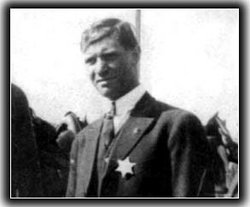 |
| Funeral procession of miners' leader, Louis Tikas, in Trinidad, April 27, 1914 (Denver Public Library) |
Today is the hundredth anniversary of the actual Ludlow Massacre, but the ambushes, gunfights, dynamitings, etc. started beforehand and continued for about ten days afterwards.
From the accounts that I have read, the spokesman for the striking miners at Ludlow, Louis Tikas, was himself killed by Colorado National Guardsmen, no doubt "while trying to escape." He was born Ilias Anastasios Spantidakis in Crete.
 |
| Louis Tikas |
I always heard—and this may just be urban legend—that the legacy of Ludlow is why there are no infantry units in the Colorado National Guard. I don't necessarily accept that as fact, but it is interesting as folklore.
Colorado Life magazine has a good article in their March/April 2014 issue, which can be ordered here.
Here is one summary from the official Ludlow Centennial website:
At the height of this conflict, on the morning of April 20, 1914, a skirmish broke out between striking miners and the Colorado State militia. This event, labeled the Ludlow Massacre, ended with the deaths of over 20 people, which included a guardsman, miners, and their wives and children. The death of children at the Ludlow Tent Colony thrust the Coalfield War into the media spotlight, with national scrutiny focused on the Rockefellers, who were majority shareholders in [the Pueblo steel mill and its mines] CF & I [Colorado Fuel & Iron]. In the aftermath of this tragedy, the Rockefellers and CF & I developed an employee representation plan that transformed industrial worker-company relations.Stop by some time — Exit 27 from Interstate 25 north of Trinidad — and walk the ground.
But the fact is, even in Pueblo, not to mention the Denver-plex, 4/20 means something else these days.
No comments:
Post a Comment